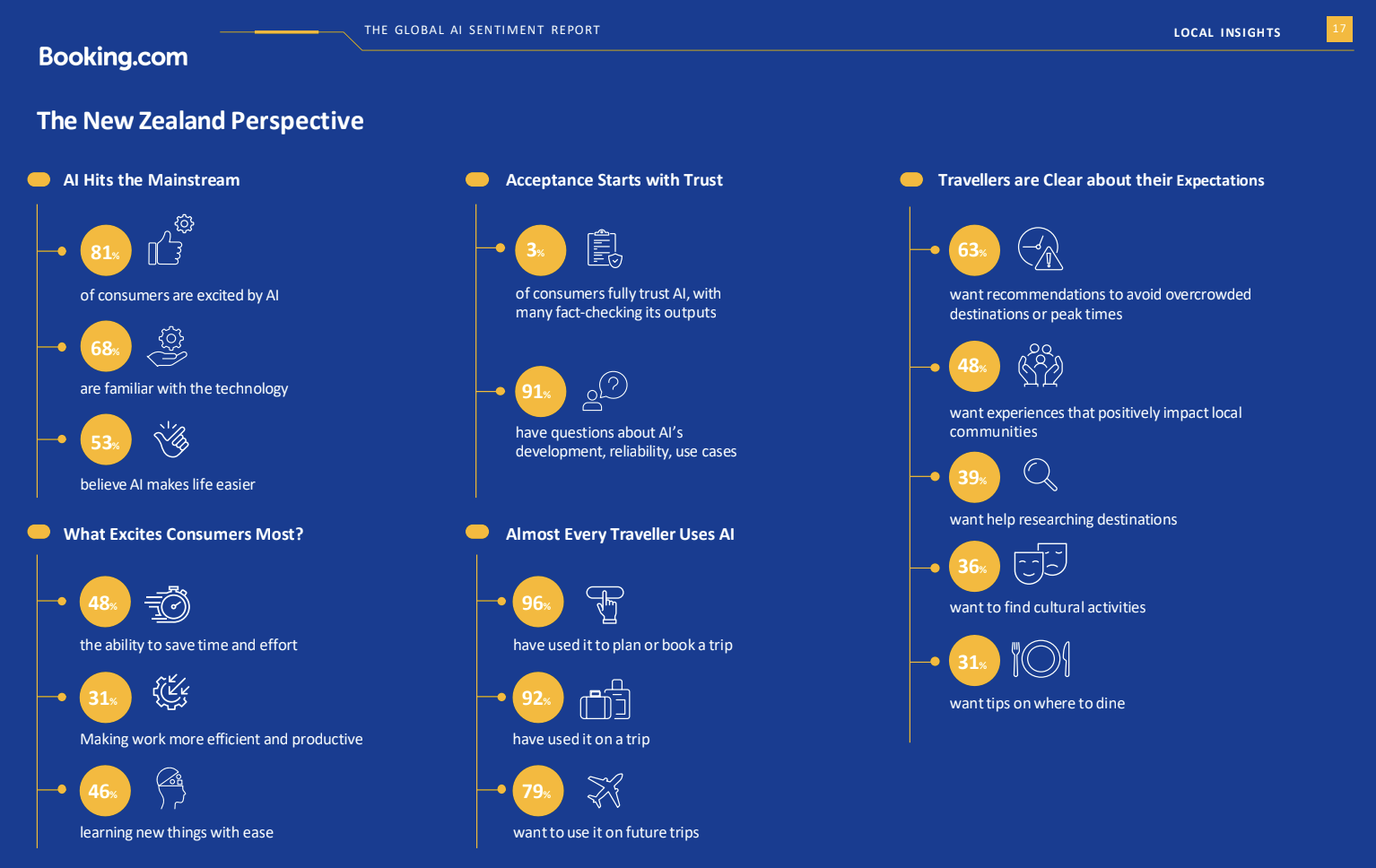Air NZ’s digital guru gets the top job as travel sector embraces AI
Air New Zealand today named Nikhil Ravishankar, the company’s Chief Digital Officer, as the company’s next CEO, succeeding Greg Foran, who will step down in October after six years in the role.
Ravishankar’s promotion suggests that digital channels and artificial intelligence are seen as critically important to the future of Air New Zealand, which recently signed a partnership with OpenAI to integrate ChatGPT-powered agents across the airline.
"It’s a privilege to step into the CEO role and take on that responsibility for our people, our customers, and our country," said today.
His appointment comes at a pivotal time for the national airline with the launch of new seating configurations, growing competition on US and Asian routes, and AI-powered search set to change how consumers plan and buy airline tickets and travel packages.
A study out this week from Booking.com looking at consumer appetite for AI to assist with making travel bookings, highlights both the vast enthusiasm and nuanced hesitations consumers hold about its expanding role.
The company’s inaugural Global AI Sentiment Report, drawing on over 37,000 responses from 33 countries (including 1,008 New Zealanders), reveals that while there is enthusiasm for using AI to find better deals and take the hassle out of travel planning, trust and comfort with fully automated systems are still evolving, particularly among Kiwis.
Source: Booking.com
Enthusiasm meets diligence
The majority of respondents expressing strong expectations that AI will soon be mainstream in trip planning. Consumers are especially excited about AI’s promise to make travel easier, save time, deliver highly personalised recommendations, and streamline the process of discovering and booking unique experiences.
According to the data, 81% of travellers in North America are excited about AI and its opportunities, although this is slightly lower than the near-universal enthusiasm found in Latin America at 98% and the Asia-Pacific region at 95%.
Familiarity with the technology is high - 74% in North America and Europe, rising to 89% in LATAM and 82% in APAC. Most travellers have already used AI in some aspect of their journey, with usage focussed primarily on planning and booking trips, and a growing segment turning to AI for decision-making while on the road.
Despite this embrace of AI-driven solutions, trust lags behind excitement. Only 3% of Kiwi respondents (mirroring trends in other markets) reported fully trusting AI, and global data reveals significant skepticism: 32% in North America and 29% in Europe feel distrust toward AI-generated information, compared with just 16% in APAC and 15% in LATAM. Fact-checking and reservations about handing over full control to AI remain the norm worldwide.
New Zealand: High hopes, measured trust
New Zealand stands out for its blend of optimism and caution. A substantial 81% of Kiwi respondents are excited about the future of AI in travel, and 68% say they are already familiar with its applications. Nearly half (46%) have used AI in a travel capacity, with the vast majority leveraging it for planning or booking (96%) or for on-the-go assistance during trips (92%).
However, just 3% fully trust AI, and 6% would feel comfortable letting AI make independent decisions on their behalf. Kiwi travellers are notably discerning, according to the research, preferring to maintain some control and to fact-check AI outputs. They are looking for technology that streamlines travel, increases efficiency, and opens up opportunities for local cultural engagement (39% want to find cultural activities; 36% seek AI-powered research support).
Trust, transparency, and human touch
The findings reflect broader industry trends. Travel platforms like Booking.com are integrating AI to personalise experiences and increase efficiency, as seen in recent launches such as Booking.com’s AI Trip Planner. Yet, successful adoption hinges on building trust and ensuring transparency. With only a small percentage of consumers ready to cede full control to AI, travel companies are focusing on AI that aids rather than replaces human decision-making.
Kiwi travellers, consistent with global counterparts, want recommendations that consider factors like overcrowding and local impact (31% are looking for guidance to avoid peak times and favour community-positive experiences). There’s a clear appetite for AI that empowers consumers rather than making unilateral decisions, with AI assistants now trusted more (13%) than social media influencers (9%) in New Zealand, even if most people still verify AI recommendations.
Read the Booking.com Global AI Sentiment Report here.
Photo credit: Yousef Alfuhigi/Unsplash

